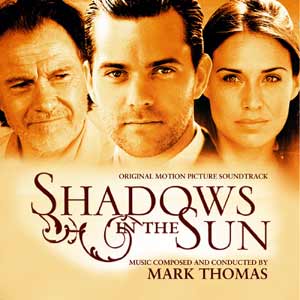Shadows of the Sun
Original score composed, orchestrated and conducted by Mark Thomas
Performed by Unnamed Ensemble
Available on Movie Score Media (MMS-06002)
Running Time: 34:29
Available from iTunes

See also:
Under the Tuscan Sun Much Ado About Nothing It’s great to see scores like Shadows in the Sun getting released, fine works accompanying low budget films that would otherwise go unreleased. Following Unknown Soldier (see my review in this edition), Mark Thomas’ little gem sees the light of the day as an iTunes release from Mikael Carlsson’s Movie Score Media. Looking at his background, Mark Thomas is hardly a newcomer: the award winning classically-trained British composer is credited with more than a hundred scores for film (Dog Soldiers, Twin Town, Agent Cody Banks 2, the animated Aristocrats and Daisies and Sprung: The Magic Roundabout) and television. Throughout his early career he served as a session and symphony orchestra violinist with both the London Symphony Orchestra and the Royal Philharmonic Orchestra. Despite all this, he is still a relatively unknown composer. Shadows in the Sun is the perfect chance to make the first step towards his music.
The 2005 movie (also known as The Shadow Dancer) from writer/director Brad Mirman tells a romantic tale about an aspiring young writer who tracks a literary titan suffering from writers block to his refuge in rural Italy, and learns about life and love from the irascible genius and his daughters. Evidently, the movie called for a romantic, Mediterranean-flavoured score. The score is built upon a rich instrumental core, where a gorgeous traditional symphony orchestra sound (with prominent violin solos) is supplemented with classical and acoustic guitar, drum set, light percussion, acoustic bass, and a variety of Mediterranean colours - the bouzouki, mandolin and accordion. Complementing this base is piano, smooth electric guitar, trumpet (regular and muted) and discretely-used electronic instrumentation.
The score is framed upon 2 main sections: the ethnic / Mediterranean-spirited pieces (mainly performed by the trademarked instrumental ensemble mentioned above), and the romantic orchestral cues. The first approach notably has an uplifting dance quality to it. Clearly showcased in pieces like ‘Shadows Beguine’ – built in 8/8 metre with an internal rhythmical structure of 4+2+2 – has a vivid dance character where accordion and mandolin lead the cue, driven by smooth and rhythmic percussion with Spanish-flavored guitar. It sounds like something Manos Hadjidakis would have written twenty years ago - it’s irresistibly cute, nostalgic, warm and incredibly melodic. ‘Romantic Daydreams’ is done in a similar way, as does ‘Hunting for Weldon’, featuring accordion, a moderate 2/4 metre, a ‘sirtaki’-like dance with mandolin (like Zorba the Greek). Nice writing for woodwinds, full orchestra with percussion, and solo violin is featured later on in this charming and playful chase cue. ‘Santa Lucia’ starts off with an orchestral waltz rendition of the famous traditional Neapolitan song of the same title, which was transcribed by Teodoro Cottrau (1827–79). It then continues into an uplifting dance piece, this time faster and in a progressively accelerating 2/4 metre, with the trademarked Mediterranean instrumental ensemble leading once again. ‘Off to Italy’ is another interesting piece, featuring mandolin and playful woodwinds mickey-mousing, adding a distinctly sneaky feel to the dance structure.
The orchestral cues exhibit romantic flair and a similar structure, with clarinet leading, and piano with cello interchanging a basic theme each time, all backed up by the full orchestra. To his credit, Thomas uses a new theme for almost each cue, although they’re quite similar in structure and slightly resemble each other. The different themes contribute a fresh composing approach, with their shared evenness being the unifying element of the score. Pieces like ‘Places in the heart’, ‘Isabella: Love theme’ and the deeply melodic and moving ‘Weldon’s Office’ all demonstrate this approach.
The two most beautiful moments of the whole work can be found towards the end of the tracklist. ‘The Writer Awakes’ is a standout cue for full orchestra, with wordless female vocal and piano solos performing a deeply moving and melancholic theme. In the concluding ‘Farewell’, a seven-note variant on the theme heard in ‘Weldon’s Office’ dominates, the piece a moving climactic piece for piano and clarinet solos and full orchestra. Feelings of ease, comfort and steadiness possess the listener while the irresistible string climax closes the score in an optimistic and warm tone.
In addition, there are some pieces that don’t fit into the smaller ensemble and symphonic underscore categories, like ‘Weldon Drives’ with its vividly bluesy and nostalgically old-fashioned dance character. Also the ‘Opening Titles’ and ‘Riding Free’, two modern, upbeat pieces on major scales reminiscent of Edward Shearmur’s K-Pax. Groovy drumming, acoustic and electric guitar, scarce electronic loops, flexible strings lines and complex violin improvisations make up these pieces, with piano deftly weaving the theme into the cue.
Mark Thomas clearly put a lot of passion into his work, arranging, orchestrating, producing and conducting the score alone. (As is often the case with low budget features.) The end result is a warm, varied, colorful and uplifting romantic score enriched with Mediterranean musical influences, vividly adding a fresh stroke of brush to a slightly jaded genre. The newly-founded Moviescore Media should be applauded for their choice to release such a gem. Film music lover who appreciate something passionate and unwearied should get hold of this.
Demetris Christodoulides
Rating:
4
Return to Reviews Index